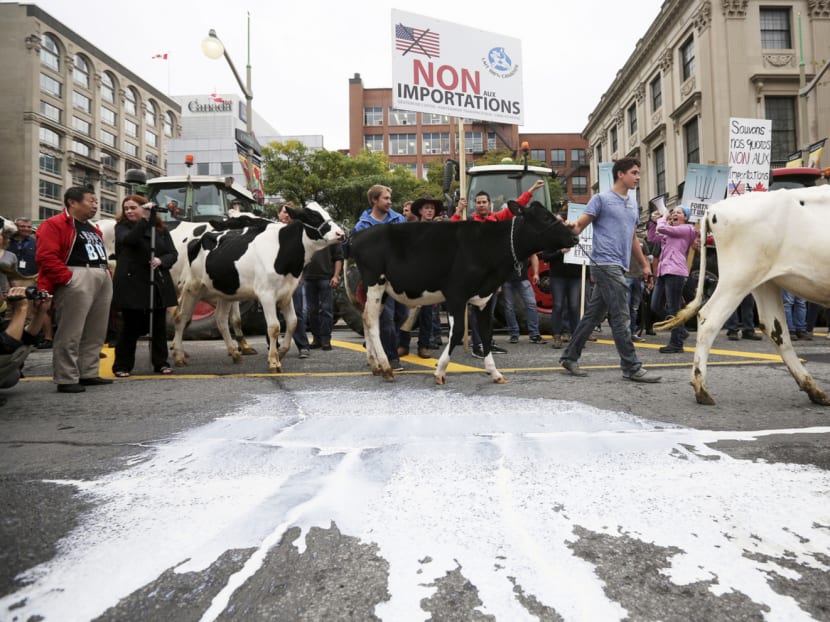TPP giving parties in Canadian elections new bone of contention
OTTAWA — While the Trans-Pacific Partnership (TPP) trade pact may well be the subject of future political battles in the United States Congress and elsewhere, its arrival amid an election campaign in Canada has ignited debate instantly.

Dairy farmers with their cows during a protest against the TPP in Ottawa last month. Farmers are worried about losing milk revenue to foreigners under the pact. Photo: Reuters
OTTAWA — While the Trans-Pacific Partnership (TPP) trade pact may well be the subject of future political battles in the United States Congress and elsewhere, its arrival amid an election campaign in Canada has ignited debate instantly.
The announcement of the deal came exactly two weeks before Canadians vote in a national election.
Already, whether Canada should ratify the agreement has become an issue of debate. With Canada’s economy dragged down by the collapse of oil prices, the pact is portrayed as a force for economic revival by Prime Minister Stephen Harper, a Conservative. Close rival Justin Trudeau, a Liberal, has called for transparent public debate before ratifying the agreement. But Tom Mulcair, leader of the New Democratic Party, says the TPP is a job destroyer.
Mr Mulcair has repeatedly pledged not to be bound by the TPP if his party forms the next government, largely because of what he believes will be its effect on automotive employment.
“If elected, Canada will not be part of an agreement that loses 20,000 jobs,” he declared at a campaign rally.
While the TPP creates opportunities for many Canadian industries, including forestry and fisheries, there are many who predict it may accelerate the gradual decline of the country’s auto and auto-parts industry.
“Absolutely, it (auto-industry jobs) is going to be an issue in the election,” said Mr Jerry Dias, national president of Unifor, a union that counts 41,000 autoworkers among its 310,000 members. “This should destroy the Conservatives in manufacturing Ontario.”
Analysts have argued that Ontario, Canada’s most populous province, will probably be decisive in determining who forms the next government.
While campaigning on Tuesday in Ontario, where the General Motors of Canada headquarters are located, Mr Harper offered the auto industry C$1 billion (S$1.1 billion) spread over 10 years to encourage construction of auto-assembly plants.
As autoworkers protested against the pact outside the factory hosting his visit, Mr Harper — who has a very slight lead in polls — insisted it would expand the industry. “We believe this deal offers enormous benefits for the automobile sector,” he said.
Canada’s auto industry is almost entirely based on exports to the US, with about 85 per cent of cars and trucks being sent there. Some experts say that the TPP could leave Canadian parts makers, which employ 81,000 people, vulnerable to backdoor competition from, among others, China, which is not part of the pact.
Mr Flavio Volpe, president of the Auto Parts Manufacturers’ Association, said that he welcomed the attention to his generally overlooked industry. But, he added diplomatically, it may be that neither Mr Harper nor Mr Mulcair is correct.
Ten large parts makers that employ half of the industry’s workers might benefit from the deal, he said. But, he added, many of the other 300 small operators “are really going to be under pressure.”
He predicted that it would take at least five years to see if the gains by the big companies will offset the small players’ losses.
In addition to the auto industry, Canadian dairy farmers are also crying over lost domestic milk revenue that will go to foreigners.
Other nations pushed Canada during the TPP negotiations to increase access to its dairy, poultry and egg sectors, where production is controlled through quotas and imports are restricted with tariffs under a system known as supply management.
Canada agreed to open — over five years — foreign quotas for 3.3 per cent of its dairy market, 2.3 per cent of its egg market, 2.1 per cent of its chicken market and 2 per cent of its turkey market in the accord, reached by trade ministers on Monday.
Milk displaced by the agreement “will result in perpetual lost revenue for our farmers,” said Ottawa-based Dairy Farmers of Canada.
The Canadian government has announced that it will offer C$4.3 billion in compensation to affected farmers. This includes an income protection programme that will provide the average dairy farmer with C$165,000 over the next 15 years.
But Mr Wally Smith, president of the dairy farm group, said that his staff are still calculating whether the package will offset farmers’ losses. “Canada needs to be in this deal,” he said. “Having to give up some access is certainly injurious, but the government has announced a compensation package that will allow farmers to suffer very little negative impact.” AGENCIES






